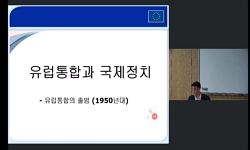Right-wing populism has recently gained momentum in many European countries, presenting a serious challenge to the norms of liberal democracy, governance, and international cooperation in Europe. These populist parties are marked by nationalism, anti-...
http://chineseinput.net/에서 pinyin(병음)방식으로 중국어를 변환할 수 있습니다.
변환된 중국어를 복사하여 사용하시면 됩니다.
- 中文 을 입력하시려면 zhongwen을 입력하시고 space를누르시면됩니다.
- 北京 을 입력하시려면 beijing을 입력하시고 space를 누르시면 됩니다.
https://www.riss.kr/link?id=A109374131
- 저자
- 발행기관
- 학술지명
- 권호사항
-
발행연도
2024
-
작성언어
Korean
-
주제어
유럽 ; 우익정당 ; 포퓰리즘 ; 외교정책 ; Europe ; right-wing party ; populism ; foreign policy
-
KDC
300
-
자료형태
학술저널
-
수록면
107-118(12쪽)
- 제공처
-
0
상세조회 -
0
다운로드
부가정보
다국어 초록 (Multilingual Abstract)
Right-wing populism has recently gained momentum in many European countries, presenting a serious challenge to the norms of liberal democracy, governance, and international cooperation in Europe. These populist parties are marked by nationalism, anti-immigrant sentiment, Euroscepticism, and opposition to globalization. They have emerged in the context of growing economic instability and social discontent, positioning themselves as protectors of the masses against corrupt political elites and challenging the existing political order. These parties are making significant gains in both domestic and European elections, exerting considerable influence on European Union politics. They advocate for protectionism, stricter immigration control, and a recalibration of foreign policy, thereby undermining Europe’s diplomatic tradition rooted in freedom, human rights, and the rule of law. The war in Ukraine has exacerbated divisions within the European right: parties in Poland have called for a firm response to Russia, while those in Hungary have taken a more conciliatory stance due to their close ties with Moscow. The EU’s policy shifts due to this rightward turn have important implications for South Korea. Economically, protectionist trends could hinder South Korea’s access to European markets. However, calls to slow down environmental protection measures may give South Korea, which is still developing its climate policies, more time to prepare. Additionally, the EU’s strengthened stance toward containing China could offer strategic advantages to South Korea in both security and economic terms.
동일학술지(권/호) 다른 논문
-
시진핑 3기 체제의 중국 대외 전략 어디로 - 시진핑 중국몽의 향배 -
- 한국외교협회
- 강준영(KANG Jun-young)
- 2024
-
- 한국외교협회
- 신범식(SHIN Beom-shik)
- 2024
-
- 한국외교협회
- 박영준(PARK Young-june)
- 2024
-
- 한국외교협회
- 김성한(KIM Sung-han)
- 2024




 DBpia
DBpia






